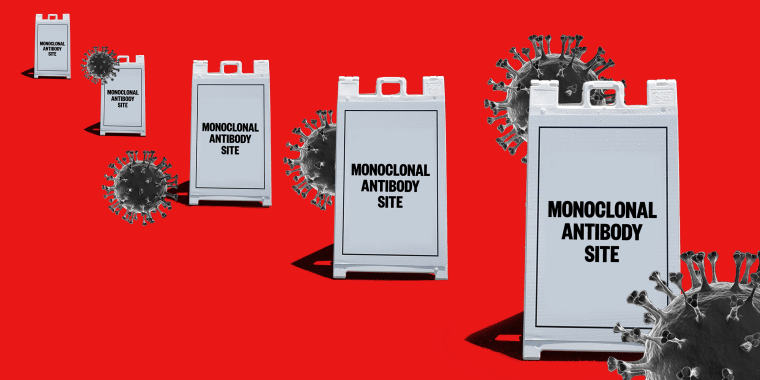Many people who oppose taking Covid-19 vaccines have cited concerns over the risks of using new technology to deal with a disease. But many of them are flocking to hospitals after having contracted Covid to get infusions of monoclonal antibodies — also a new technology to deal with a disease. This may seem like a paradox, but it isn’t a mystery. This tale of two technologies shows that vaccine hesitancy isn’t simply fear of new inventions but often a symptom of retrograde ideology.
Vaccine hesitancy isn’t simply fear of new inventions, but often a symptom of retrograde ideology.
In our hyperpolarized political climate, the vaccines have been embraced most readily by liberals and become a symbol of The Establishment, and vaccination efforts are seen as a way for people to protect themselves but also to demonstrate social solidarity. By contrast, monoclonal antibodies — which are administered through infusions or a series of injections and have proven to be effective at preventing hospitalization if they are received within seven to 10 days of the appearance of symptoms — have until recently flown under the radar and once received a high-profile endorsement from former President Donald Trump. And the fact that the drug can be administered after one falls ill makes it compatible with the ruthless individualism championed by the right throughout the pandemic.
While vaccines protect the people who receive them, they also represent a step toward protecting others in their community by reducing infection and transmission rates. But monoclonal antibodies are generally being turned to as a way to manage Covid after it has been contracted and possibly spread within a community. Relying purely on monoclonal antibodies allows people to bury their heads in the sand about the consequences of their behavior for others — which is exactly how the right has conceived of freedom for the duration of the Covid crisis.
About 70 percent of the orders for monoclonal antibodies in recent weeks have come from seven Southern states, six of which rank in the bottom 10 for vaccinations. As The New York Times has reported, those statistics on monoclonal antibodies and vaccination rates are directly linked: Many Americans in conservative areas who have been disinclined to get vaccinated have instead opted to turn to monoclonal antibodies after getting sick with Covid.
But there are drawbacks to them: The cost is about a hundred times that of a vaccine, which puts a much greater financial burden on the federal government, which is footing the bill, and they’re far more difficult to administer. An infusion takes about 90 minutes when one factors in time for monitoring afterward, which means people requesting them take up sustained staff attention and significant space in already crowded and overburdened hospitals. And medical experts have cautioned that monoclonal antibodies can’t substitute for the vaccines because they’re not as durable and because they’re effective for only a certain window of time after symptoms appear.
Public health experts see both vaccines and monoclonal antibodies as important weapons in society’s arsenal against Covid. But some vaccination skeptics give only the latter attention. The use of monoclonal antibodies has exploded as a solution for treating Covid in recent months as hospitals and other health care centers have increased their offerings of the drug — particularly in the vaccine-hesitant South.
The favoritism doesn’t exactly make sense if the core reason for rejecting the vaccines is distrust of a new invention. Although some vaccination skeptics say they don’t want to be guinea pigs for recently developed Covid vaccines, monoclonal antibodies for Covid have also been recently developed in a lab, our knowledge of them isn’t complete, and they’ve been rolled out under emergency authorization by the Food and Drug Administration. And while some say their opposition to vaccines emerges from their wariness of Big Pharma and Uncle Sam, monoclonal antibodies, theoretically, should be just as concerning. As with the vaccines, to be infused with monoclonal antibodies entails putting a substance in one's body made by major pharmaceutical companies that are coordinating with the government.
A critical reason that monoclonal antibodies have emerged as an alternative to the vaccine for vaccine skeptics is that the drug has managed to avoid the taint of the culture wars. While the federal government, public health authorities and the mainstream media have devoted an enormous amount of time and attention to vaccines, those institutions have discussed monoclonal antibodies far less, and the treatment option gained traction only in recent months as it became more available. That means there’s been less opportunity for the treatment to become conflated with “Liberal Establishment” thinking about the pandemic — and for the drug’s reputation to be poisoned by right-wing contrarianism.
Vaccines code as “liberal” to many on the far right, while monoclonal antibodies don’t.
In addition, Trump championed them as a “miracle” cure after he contracted Covid last year, even though the specific treatment he received was an exclusive experimental cocktail unavailable to the public. For what it’s worth, Trump also took a vaccine while he was in the White House — but he did so secretly, and he has since avoided full-throated advocacy for them.
In short: Vaccines code as “liberal” to many on the far right, while monoclonal antibodies don’t. Consider this quotation from Lanson Jones, a Texan who rejected the vaccines but eagerly sought out monoclonal antibodies after he got Covid: “The people you love, you trust, nobody said anything negative” about monoclonal antibodies, he told recently The New York Times. “And I’ve heard nothing but negative things about the side effects of the vaccine and how quickly it was developed.”
In an evidence-based scenario, vaccines would universally be considered a first line of defense and monoclonal antibodies would serve as a backup. Unfortunately we’re far from such a scenario — a significant proportion of people are, because of a blinkered and hyper-individualistic worldview, inclined to prioritize a reckless and selfish approach that will only prolong our crisis.

